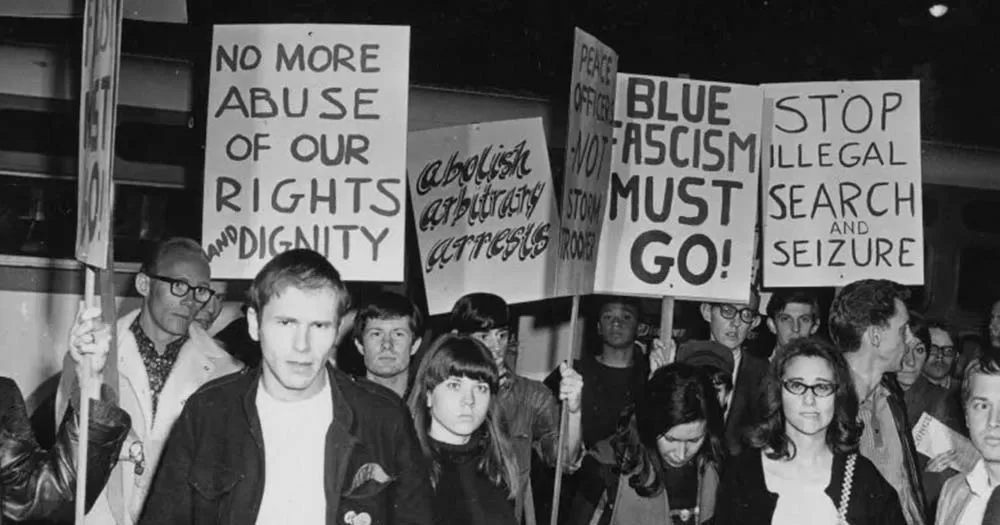While the 1969 Stonewall Riots are largely recognised as the watershed event that transformed the American Gay Rights movement, several acts of queer resistance, including the response to the Black Cat Tavern raid of 1967, played a major role in queer liberation.
In the 1960s, LGBTQ+ Americans struggled to create safe spaces free of police violence. One neighbourhood called Silver Lake in Los Angeles was home to several gay-owned and LGBTQ+-friendly businesses, and it felt like a sanctuary for queer community.
At midnight on January 1, 1967, as queer partygoers celebrated the New Year with toasts and kisses, police officers dressed in plain clothing raided the Black Cat Tavern and the neighbouring gay bar, New Faces, and began beating patrons and staff for exchanging same-sex kisses.
The officers arrested 16 people and seriously injured several others, including New Faces’ owner, Lee Roy, a woman who officers falsely accused of being a man in drag, and waiter Robert Haas who endured cracked facial bones, severe bruising and a ruptured spleen.
Today in LGBT+ History: January 1, 1967 – In the first hour of the new year, a raid occurs at the Black Cat Tavern in the Silverlake area near Los Angeles. Several hundred people spontaneously demonstrate on Sunset Boulevard and picket outside the Black … https://t.co/uvDYhaImA0 pic.twitter.com/Qs9dwBJkDg
— FocusMiddleTennessee (@focusmidtenn) January 1, 2018
Media outlets incorrectly described the raid as a riot, with the violence and intentional spread of misinformation prompting members of Los Angeles’ LGBTQ+ community to organise a peaceful protest against police brutality.
On January 5, 1967, a series of protests were organised by PRIDE (Personal Rights in Defense and Education), marking the first time the term ‘Pride’ was associated with LGBTQ+ rights. PRIDE’s strategy was modelled after the Black Civil Rights movement, organising a series of non-violent protests in response to systematic oppression.
This was the first recorded time LGBTQ+ protestors organised against police violence, and their resistance movement directly influenced the trajectory of LGBTQ+ rights.
Steve Ginsburg was founder of Chutzpah, the first west coastgay Jewish group. He also founded PRIDE(Personal Rights in Defense of Education) in LA. After the raid on the Black Cat Tavern in 1967, PRIDE quickly organized demonstrations. Two days later, the Stonewall riots began. pic.twitter.com/qIaygQ3h3D
— NC Queer and Trans Revolutionary Network (@nc_tran_) June 15, 2023
One month following the raid, on February 11, 1967, at least 200 people joined a protest outside the Black Cat Tavern.
Most of the protestors were not activists or organisers, rather, they were everyday people with nine-to-five jobs who happened to be LGBTQ+. They worked together to advocate for self-empowerment while continuing to be seen as contributing members of society.
Allies who were horrified by the violence inflicted on the Los Angeles queer community during the raid also joined in, including at least four church ministers.
While police waited on the sidelines looking for any reason to intervene, the protesters went out of their way to keep the protest peaceful. They walked up and down the block so they could not be charged with loitering, and quickly picked up any flyers that were dropped so they couldn’t be arrested for littering.
According to the One National Gay and Lesbian Archives, the Black Cat Tavern protest was the largest LGBTQ+ demonstration of its time.
Feb 11, 1967: LA’s LGBTQ community protested outside the Black Cat Tavern in #SilverLake in response to an LAPD raid on New Year’s Eve. LA Times (2017): https://t.co/daLjqhMwu7
@OneArchives photos at @USCLibraries: https://t.co/nzXVNUnPar #LGBTQhistory #BlackCat67 pic.twitter.com/CYH3d0FfDK
— LAhistory (@LAhistory) February 11, 2021
In January 1969, two years after the Black Cat Tavern raid The Advocate published a piece called ‘Black Cat Revisited’ written by survivor Mel Holt. The article warned queer readers about the potential of future police brutality and called for a unified gay rights movement.
Since it was the largest queer publication at the time, this article likely reached New York’s LGBTQ+ community, and the Stonewall Riots happened two months later.
The Black Cat Tavern has changed names several times over the years, but in 2012, it reopened as a gastropub called The Black Cat. In 2008, the building was formally recognised as a Los Angeles Historic-Cultural Monument for its role in the LGBTQ+ civil rights movement.
© 2024 GCN (Gay Community News). All rights reserved.
Support GCN
GCN is a free, vital resource for Ireland’s LGBTQ+ community since 1988.
GCN is a trading name of National LGBT Federation CLG, a registered charity - Charity Number: 20034580.
GCN relies on the generous support of the community and allies to sustain the crucial work that we do. Producing GCN is costly, and, in an industry which has been hugely impacted by rising costs, we need your support to help sustain and grow this vital resource.
Supporting GCN for as little as €1.99 per month will help us continue our work as Ireland’s free, independent LGBTQ+ media.

comments. Please sign in to comment.